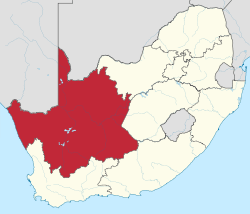Government of the Northern Cape
| This article is part of a series on the politics and government of the Northern Cape |
|
The Northern Cape province of South Africa is governed in a parliamentary system in which the people elect the provincial legislature and the legislature, in turn, elects the Premier as head of the executive. The Premier leads an Executive Council consisting of members who oversee various executive departments. The structure of the provincial government is defined by chapter six of the Constitution of South Africa.
Legislature
The Northern Cape Provincial Legislature, situated in Kimberley, is the legislative branch of the provincial government. It is a unicameral legislature of 30 members, elected by a system of party-list proportional representation. An election is held every five years, conventionally at the same time as the election of the National Assembly.
After the election of 22 April 2009 there were 19 members of the provincial legislature (MPLs) representing the African National Congress, five representing the Congress of the People, four representing the Democratic Alliance and two representing the Independent Democrats. The Independent Democrats are in coalition with the Democratic Alliance.
Executive
The Premier of the Northern Cape is the head of the provincial government; he or she is chosen by the members of the provincial parliament from amongst themselves. The Premier appoints Members of the Executive Council (MECs) to oversee the various departments of the provincial government. The Director-General is the non-political head of the provincial administration, while each department is led by a Head of Department. The current Premier is Sylvia Lucas of the African National Congress. Besides the Premier, the Executive Council consists of ten MECs overseeing eleven departments.
| Portfolio | MEC | Department |
|---|---|---|
| Agriculture, Land Reform and Rural Development | Norman Shushu | Agriculture, Land Reform and Rural Development |
| Co-operative Governance, Human Settlements and Traditional Affairs | Alvin Botes | Co-operative Governance, Human Settlements and Traditional Affairs |
| Education | Grizelda Cjiekella | Education |
| Environment and Nature Conservation | Patrick Mabilo | Environment and Nature Conservation |
| Finance, Economic Affairs and Tourism | John Block | Provincial Treasury |
| Economic Development and Tourism | ||
| Health | Mxolisi Simon Sokatsha | Health |
| Roads and Public Works | Dawid Rooi | Roads and Public Works |
| Social Development | Tiny Chotelo | Social Development |
| Sport, Arts and Culture | Pauline Williams | Sport, Arts and Culture |
| Transport, Safety and Liaison | Ntsikelelo Jack | Transport, Safety and Liaison |
Judiciary
South Africa has a single national judiciary; there is no separate system of provincial courts. The Northern Cape Division of the High Court of South Africa in Kimberley has jurisdiction over all cases arising in the province, but generally handles only the most serious or high-profile criminal trials, high-value civil trials, cases involving judicial review of legislation or executive actions, and appeals from the magistrates' courts. Judges of the High Court periodically go on circuit to hear cases in parts of the province distant from Kimberley. Appeals from the High Court are to the national Supreme Court of Appeal and ultimately (if a constitutional matter is involved) to the Constitutional Court.
The province is divided into 26 magisterial districts and 6 sub-districts, each of which is served by a district magistrate's court. There are a further 24 branch and periodical courts to serve geographically dispersed districts. These district courts have jurisdiction over all criminal cases except murder, rape and treason and can impose a fine of up to R100,000 or a prison sentence of up to three years; and they have jurisdiction over civil cases where the value of the claim is less than R100,000. The regional magistrate's court for the Northern Cape, which sits at multiple locations in the province, has jurisdiction over all criminal cases except treason and can impose a fine of up to R300,000 or a prison sentence of up to fifteen years (or life in some circumstances). The regional court also has jurisdiction over civil cases where the value of the claim is less than R300,000, and divorce and family law cases.
Local government
.svg.png)
The Northern Cape is divided into five district municipalities which are subdivided into twenty-four local municipalities. The municipalities are listed below.
- Namakwa District Municipality: Richtersveld Local Municipality, Nama Khoi Local Municipality, Kamiesberg Local Municipality, Hantam Local Municipality, Karoo Hoogland Local Municipality, Khâi-Ma Local Municipality
- Pixley ka Seme District Municipality: Ubuntu Local Municipality, Umsobomvu Local Municipality, Emthanjeni Local Municipality, Kareeberg Local Municipality, Renosterberg Local Municipality, Thembelihle Local Municipality, Siyathemba Local Municipality, Siyancuma Local Municipality
- Siyanda District Municipality: Mier Local Municipality, Kai !Garib Local Municipality, //Khara Hais Local Municipality, !Kheis Local Municipality, Tsantsabane Local Municipality, Kgatelopele Local Municipality
- Frances Baard District Municipality: Sol Plaatje Local Municipality, Dikgatlong Local Municipality, Magareng Local Municipality, Phokwane Local Municipality
- John Taolo Gaetsewe District Municipality: Joe Morolong Local Municipality, Ga-Segonyana Local Municipality, Gamagara Local Municipality
